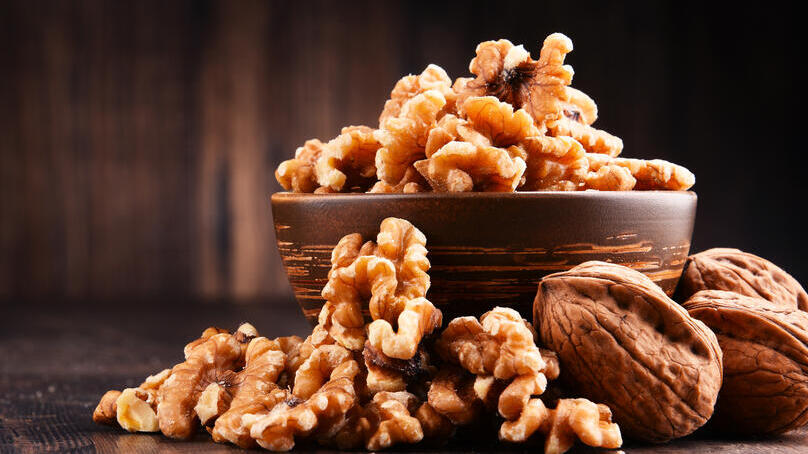Historically reserved for royalty and nobility since the Babylonian era, and recognized by ancient Greek physicians as not only tasty but also "brain-healthy," walnuts have long been celebrated for their health benefits across all classes. Here are several health benefits of incorporating walnuts into your diet:
Walnuts are a rich source of alpha-linolenic acid, an omega-3 fatty acid. Research indicates that omega-3 fatty acids are essential for heart health and can reduce the risk of heart disease. A 30-gram serving of walnuts provides about 2.5 grams of alpha-linolenic acid.
These nuts are also packed with vitamin E and polyphenols, which are potent antioxidants. These antioxidants help protect cellular health by combating oxidative damage caused by free radicals, which can result from sun exposure, processed foods, smoking and stress. Vitamin E helps neutralize these free radicals, reducing oxidative stress and potentially lowering the levels of harmful LDL cholesterol that can build up in blood vessel walls, thus reducing heart disease risk.
Weight management
Walnuts can help maintain a healthy weight by promoting a feeling of fullness. Thanks to their healthy fats and dietary fiber, walnuts can prolong satiety. However, portion control is still essential for weight loss.
Digestive system health
The microbiota composition in our digestive system plays a crucial role in our overall health, affecting the immune system, digestion and even brain function. Consuming walnuts has been shown to improve the gut microbiota, supporting the healthy function of various body systems.
Brain health
Omega-3 fatty acids and antioxidants in walnuts contribute to maintaining healthy brain function. The healthy fats, polyphenols and vitamin E in walnuts can reduce inflammation and oxidative stress in brain cells. Studies in older adults show that walnuts can enhance brain function, especially memory.
Skin and hair health
Vitamin E in walnuts helps protect the skin from sun damage and aids in skin repair and cell renewal. Additionally, walnuts contain biotin (vitamin B7), essential for producing keratin and collagen, which are vital for healthy hair, skin and nails. Regular consumption of walnuts can strengthen hair and help reduce hair loss.
Improved sleep quality
Walnuts contain tryptophan, an amino acid involved in producing serotonin, a hormone that promotes calm. They also contain melatonin, which helps induce sleep. Consuming walnuts can benefit those who do not efficiently produce melatonin, assisting them in falling asleep more easily.
The recommended daily intake is about 30 grams of walnuts (12-14 halves), which contains: 185 calories, 18 grams of fat, 2 grams of fiber, 4 grams of carbohydrates and 4 grams of protein.
It is advisable to purchase walnuts in their natural form (unroasted) and store them in a cool, shaded place (preferably in the refrigerator) to prevent fat oxidation. They can be sprinkled on salads, added to yogurt with fruit, crushed and sprinkled over stir-fried dishes, or combined with dates.
Walnuts are always welcome
Walnuts are celebrated for their versatility in both culinary and nutritional contexts. They can be seamlessly incorporated into various dishes, enhancing flavor and adding a nutritious boost. Here are some ways to utilize walnuts:
Salads: Chopped or whole walnuts add a delightful crunch and nutty flavor to salads. They pair well with leafy greens, robust cheeses and vinaigrette dressings.
Yogurt and fruit parfaits: For a nutritious breakfast or snack, sprinkle chopped walnuts over yogurt layered with fruits. This combination offers a good balance of protein, healthy fats and carbohydrates.
Baked goods: Walnuts can be incorporated into muffins, breads and cookies, providing texture and flavor. They're especially popular in banana walnut bread and oatmeal walnut cookies.
Stir-fried and cooked dishes: Crushed walnuts can be added to stir-fried vegetables, pasta dishes, or even rice preparations to introduce an unexpected texture and boost the dish's nutritional value.
Snacking: Simply toasting walnuts with a sprinkle of salt can make for a satisfying and healthy snack. They can also be mixed with other nuts and dried fruits for a homemade trail mix.
 Shira SolowPhoto: Racheli Chai Minyan
Shira SolowPhoto: Racheli Chai MinyanSmoothies: For an added dose of omega-3 fatty acids, blend walnuts into smoothies. They contribute to a creamy texture and are a great way to increase the nutritional content of your drinks.
Pesto and sauces: Ground walnuts can be used to make pesto, providing a twist on the traditional pine nut recipe. They can also be blended into sauces to add thickness and flavor.
Stuffing and filling: Chopped walnuts are excellent in stuffed recipes, whether it's for stuffing chicken, fish, or vegetables like bell peppers and mushrooms.
Desserts: Walnuts are a staple in many desserts, from brownies and fudge to traditional baklava and walnut pie.
Shira Solow is a clinical dietician with The Levinsky-Wingate Academic Center


